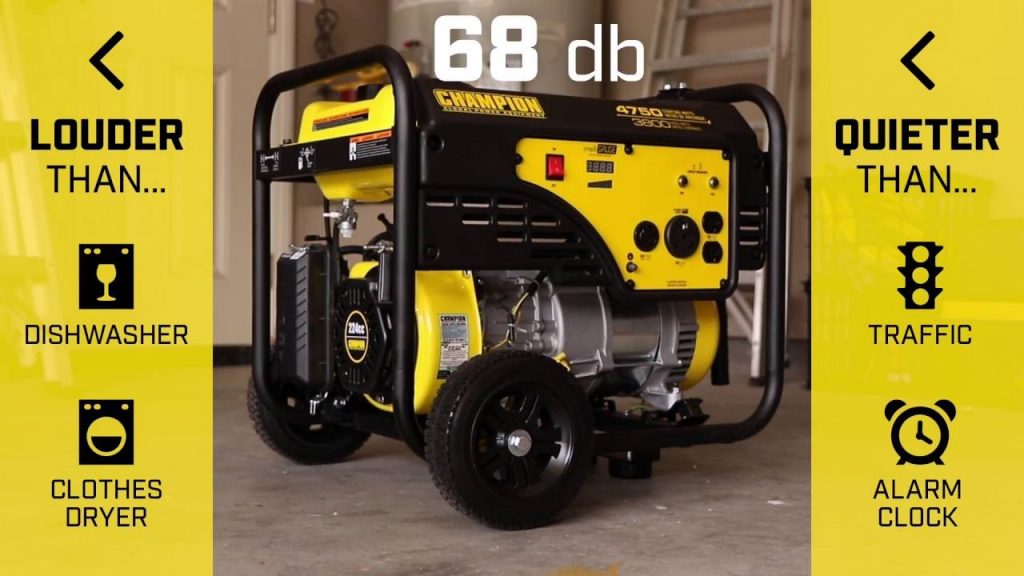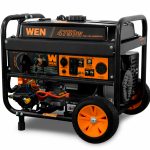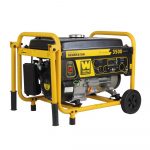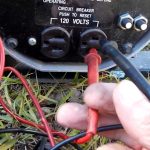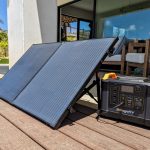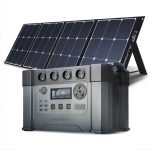A Champion generator has a decibel rating to match its power output, making it a relatively loud machine. The decibel rating for a Champion generator can range anywhere from 60-70 decibels, depending on the size and model of the generator. This range is within the same range as standard household appliances like a vacuum cleaner, making it comparable in terms of noise levels. For example, a 5500-watt generator can generally produce up to 70 decibels of noise, which is equivalent to the sound of a lawnmower. While the decibel rating of a Champion generator may seem relatively loud, it can be reduced considerably by using a muffler or soundproofing material.
By using mufflers or soundproofing material, the decibel rating can be reduced by up to 10-15 decibels, making the generator much quieter than it would be without such accessories. In conclusion, a Champion generator is relatively loud compared to other household appliances, but the noise levels can be reduced by using a muffler or soundproofing material. With these accessories, the decibel rating of a Champion generator can range anywhere from 50-60 decibels, making it much quieter and easier to handle.
Is the Champion generator quiet?
Generator decibel ratings are important for determining the amount of noise a generator makes. The decibel level is a measure of sound intensity, and a higher decibel rating means a louder generator. When it comes to the Champion generator, the decibel rating determines how quiet the generator is. The Champion generator has a decibel rating of 65. This is considered quite quiet, as the average decibel rating of a generator is between 65 and 75.
In comparison to other generators of the same size, the Champion generator is one of the quietest on the market. It is ideal for those looking for a low-noise power source for their home or business. The Champion generator is designed with noise-reducing technology, which helps to keep the decibel rating low. It also has a soundproof housing which helps to further reduce the sound. Overall, the Champion generator is one of the quietest generators on the market. It is perfect for those who are looking for a low noise power source for their home or business.
What is a good noise level for a generator?
Generally, a good noise level for a generator is one that is below 70 decibels. This is the noise level of a regular conversation and is considered to be acceptable for most environments. However, some generators can produce noise levels well above this threshold, ranging from 75 decibels to 85 decibels. This higher level of noise can be extremely disruptive, especially in residential areas. When purchasing a generator, make sure to check its decibel rating.
A lower decibel rating will mean a quieter generator, while a higher rating will indicate a louder generator. If a generator has a decibel rating of 70 or below, it can be considered to be a good noise level for a generator. This is a significant reduction in noise pollution that can help keep your home and neighborhood peaceful and quiet. Finally, when it comes to maintenance, generators with good noise levels tend to last longer and remain in better condition than those with poor noise levels. This helps to ensure that your generator will remain safe and reliable for years to come.
Is 72 dB loud for a generator?
Generator decibel ratings are an important factor to consider when operating a generator. It is important to understand the level of noise a generator can create and how that noise can affect its environment. A decibel is a unit used to measure the intensity of sound. The higher the decibel level, the louder the sound. Generally, a generator with a rating of 72 dB is considered to be quite loud – more than that of a vacuum cleaner or air conditioner.
The accepted range for a generator is between 60 dB and 90 dB. A generator at the lower end of the range is considered to be quieter, while those at the higher end are considered to be louder. At 72 dB, a generator is on the louder side and should not be operated too close to people or animals. It is important to consider the distance and direction of the generator to ensure safety. The closer it is to people, the more dangerous it can be. In summary, 72 dB is considered to be loud for a generator. It is important to consider the decibel rating of a generator before operating it and be aware of the potential risks it can pose to people and animals if it is located too close to them.
How many decibels is considered quiet for a generator?
Generator decibel ratings measure noise levels generated by different types of generators. A typical generator operating at full capacity can generate noise levels of up to 90 decibels, which many people find disruptive. For a generator to be considered quiet, it should not exceed 60 decibels. A noise level of 60 decibels is equivalent to the noise of a normal conversation. This level of noise is much quieter than a generator running at full capacity and will not be disruptive or intrusive.
To ensure a quiet environment, it is important to choose a generator that operates at a noise level of 60 decibels or less. This will ensure that the generator does not intrude on people’s enjoyment of the environment. If you are looking for a generator for a residential area, you should try to find one that operates at a noise level of 50 decibels or lower. This will ensure that the noise from the generator does not disturb neighbors or nearby wildlife. When comparing different types of generators, it is important to take decibel ratings into consideration. Knowing how many decibels is considered quiet for a generator can help you make an informed decision when selecting the best generator for your needs.
What is a good decibel level for a generator?
A good decibel level for a generator is typically between 60-70 decibels. This is considered to be a safe level to operate a generator without damaging the environment or causing any hearing damage. Generator decibel ratings are generally measured at a distance of 7 meters from the generator. At 7 meters, the measurement is generally 5 decibels lower than at the source. This is because sound pressure decreases the more distance it has to travel.
When considering a generator’s decibel rating, it is important to remember that higher decibel ratings indicate louder noise levels. It is also important to note that higher decibel ratings can have a negative impact on the environment and can cause hearing loss with long-term exposure. For most residential generators, it is best to stay within the 60-70 decibel range in order to minimize any potential health risks. However, for commercial or industrial applications, it is important to consult experienced professionals to ensure that the generator is operating safely and efficiently. In summary, a good decibel level for a generator is typically between 60-70 decibels. This is a safe range for residential and commercial applications in order to minimize any potential health risks associated with prolonged exposure to loud noise.
How many dB is a Generac generator?
Generac generators are rated on the decibel (dB) scale to determine noise levels. Generally, the higher the dB rating, the louder the generator. Generac generators range from 60 to 80 dB depending on the model. For comparison, a conversation between two people is usually around 60 dB, while a lawn mower is usually around 90 dB. Generac recommends that its generators be operated at least 10 feet away from any residential dwellings, and that the generator be placed at least 25 feet away from windows and doors.
The National Park Service also has regulations for generators running near National Parks. Generally, these regulations are more strict with a noise level of no more than 60 dB at a distance of 50 feet or more. It is important to be aware of the noise levels when operating a Generac generator, as it could be disruptive to the environment and your neighbors.
How loud is 70 dB generator?
Generator decibel ratings refer to the level of noise generated by a generator relative to a specific standard. A rating of 70 dB on a generator indicates a sound level that is moderate in intensity. It is equivalent to the noise level of a vacuum cleaner operating at close proximity, or a conversation between two people three feet away. At 70 dB, the generator will produce a sound that is still audible but not as loud as a lawnmower or a car horn. It is common for generators to produce decibel levels ranging from 40 dB to 80 dB.
Generator decibel ratings of 70 dB or higher can become a nuisance to those in the area. This is especially true when the generator is used at close proximity or in an enclosed space. It is important to take measures to reduce the sound from the generator by using noise-reducing products, such as sound barriers and mufflers. Additionally, it is important to exercise proper generator maintenance to ensure the generator runs at its optimal level, as this can help reduce noise levels. Regularly changing the engine oil and air filter, as well as checking the spark plugs can help keep the sound level of the generator at a minimum. In general, the noise generated by a generator rated at 70 dB is moderate and can be easily tolerated for a period of time. However, it is important to take the necessary steps to reduce the sound from the generator to prevent long-term hearing damage.
How many dB is a silent generator?
Generator decibel ratings measure the amount of noise a generator produces. A silent generator is one that produces no more than 40 decibels, which is about the same noise level as a quiet whisper. Generators that are produced specifically with low noise in mind often have a decibel rating of around 35 dB. At the opposite end of the spectrum, generators used for construction sites and other large events may produce upwards of 70 dB or more. This is equivalent to the noise level of a vacuum cleaner, and can be quite disruptive.
For residential use, the best generators are between 35 dB and 45 dB. Anything lower than 30 dB is generally considered to be whisper quiet and won’t be heard by most people in the same room. The decibel rating of a generator is an important factor to consider when shopping for one. A silent generator is the ideal option for residential use, as it produces little to no noise while still providing the necessary power.
Is 70 dB loud for a car?
The decibel ratings of a car’s generator are an important measure of its noise level. Generally, the lower the rating, the quieter the generator. A rating of 70 dB is considered to be quite loud for a car generator. It is significantly louder than the average rating of a car generator, which is typically between 40-50 dB. If you’re looking for a quieter car generator, you may want to look for a model with a rating of less than 70 dB.
Noise ratings of car generators can vary significantly depending on the make and model. Some car generators may have a noise rating of up to 80 dB, while others may be as low as 50 dB. It’s important to research the specific decibel ratings of the car generator before making a purchase to ensure it is the appropriate level of noise for your needs. In conclusion, 70 dB is loud for a car generator, and those who are looking for a quieter car may want to look for a generator that has a decibel rating lower than 70 dB.
How many dB is a Honda generator?
A Honda generator typically produces between 54 and 64 dB of sound when in use. This is slightly louder than the normal conversations of people, which usually range between 40 and 60 dB. Generator decibel ratings are used to measure the amount of noise that a generator produces when in operation. The higher the decibel rating, the louder the noise. Honda generators usually fall into the moderate noise range, which is measured between 54 and 64 dB.
The decibel rating for a Honda generator is typically written in the product description or printed on the product itself. Knowing the decibel rating of a generator can help you to decide whether it is suitable for your needs. It should also be noted that the decibel rating of a Honda generator may vary depending on the size and model of the generator. Generators that produce more power will typically have a higher decibel rating than those that produce less power. Finally, it is important to remember that decibel ratings are not always accurate. The actual sound level produced by a generator may differ from the decibel rating due to a variety of factors, such as how far away the generator is and the environment in which it is used.
What is the quietest type of generator?
The quietest type of generator is one with a low decibel rating. Decibel ratings measure the amount of sound that a generator generates. Low decibel ratings indicate that the generator is quieter. Generally, a decibel rating of less than 65 dB is considered to be a quiet generator. Decibel ratings are often listed in the product specifications of a generator.
It is important to check the decibel rating before buying a generator, as the quietness of the generator may be affected by the environment it is used in. For example, a generator with a decibel rating of 60 dB may seem very quiet when used outdoors, but may be much louder when used indoors. When looking for a quiet generator, it may be beneficial to consider a generator with a low decibel rating. This is especially true for applications which require low noise levels, such as camping sites or areas where noise is a factor. Additionally, a generator with a low decibel rating is often more energy-efficient than a generator with a higher decibel rating. In summary, the quietest type of generator is one with a low decibel rating. Low decibel ratings indicate a low level of noise, making them ideal for applications which require lower noise levels. Additionally, a generator with a low decibel rating is often more energy-efficient.
What is the decibel level of a portable generator?
Generator decibel ratings are a measure of how loud a generator is when it is running. Portable generators typically produce noise levels of between 50 and 80 decibels, depending on the size. A 50 decibel noise level is about the same volume as a normal conversation in a quiet room, while an 80 decibel noise level is equivalent to the sound of a vacuum cleaner running. When shopping for a portable generator, it is important to consider the decibel rating. A higher decibel rating means the generator is louder, so you should choose a generator with a low decibel rating if you want a quieter machine.
Many manufacturers list the decibel rating of their generator models on their website, so you can easily compare different models and choose the one with the lowest decibel level. Decibel levels can have a significant impact on how much you enjoy using your generator. If you choose a generator with a high decibel level, it might be too loud to use in certain locations and may even cause hearing damage if you are exposed to the noise for too long. On the other hand, a generator with a lower decibel rating will be much quieter and more pleasant to use. Overall, the decibel level of a portable generator can range from 50 to 80 decibels, depending on the size and model. When shopping for a generator, it is important to consider the decibel rating so you can choose a machine that is the right balance between power and noise level.
What is the most efficient portable generator?
A portable generator can be a great way to provide emergency power backup in the event of a power outage. The most efficient portable generator is one with the lowest generator decibel rating. Decibel ratings measure how loud the generator is, so lower is better. A generator with a low decibel rating is usually more efficient as it is quieter and uses less fuel to produce the same amount of power. The most efficient portable generators are usually those that are designed to operate at lower RPMs and quieter.
This makes them ideal for areas where noise pollution is a concern, such as residential areas or campsites. Portable generators are also designed to be efficient and lightweight, so they can be easily transported and used in a variety of locations. In summary, the most efficient portable generator is one with a low decibel rating, designed to operate quietly and efficiently while being lightweight and portable.
What is the best quiet portable generator?
Generator decibel ratings are a great way to measure the sound of a generator, with the lower decibel ratings indicating the quieter generators. A generator with a decibel rating of less than 65dB is considered a quiet portable generator. When shopping for a quiet portable generator, look for a generator with high-quality sound dampening materials such as reinforced steel and housing that provides additional soundproofing. Additionally, look for a generator with an engine that is specifically designed to emit a low frequency sound. When comparing various models, take into consideration the wattage, fuel type, and the generator’s decibel rating.
A generator with a low decibel rating but high wattage will be quieter than a generator with a high decibel rating and lower wattage. It is important to remember that the decibel rating of a generator is only one factor when looking for the best quiet generator. You should also consider the overall size of the generator, the noise dampening technology, the engine type, and the power output. These are all important factors to consider when looking for the best quiet portable generator. By researching various models and their features, you can find the right generator for your needs.
What are the best portable electric generators?
Generator decibel ratings are important to consider when choosing the best portable electric generator for your needs. High decibel ratings can cause an unpleasant level of noise pollution, so it is important to select a generator that operates at a low decibel level. The lower the decibel rating, the quieter the generator. Generally, generators rated at 70 decibels or less are considered quiet and efficient. When choosing a portable electric generator, it is important to consider the decibel rating and compare it to similar models.
As an example, a generator rated at 67 decibels will be much quieter than a generator with a rating of 90 decibels. This will help you make the best choice for your needs. In terms of the best portable electric generators, look for ones with a low decibel rating, as this will help ensure a quiet operation. Additionally, look for features such as fuel efficiency and portability. Quality electric generators can provide reliable power when and where you need it. Finally, it is important to ensure that you are familiar with the generator’s decibel rating before you purchase it. As a general rule of thumb, the lower the decibel rating, the quieter the generator will be, so look for one with a rating of 70 decibels or lower. This will help ensure that you get the most out of your portable electric generator.
How loud is 65 decibels generator?
Generator decibel ratings are measured on a logarithmic scale, ranging from 0 as the lowest sound level to 120 or higher as the highest level. 65 decibels is generally considered to be a moderate sound level, equivalent to normal conversation and background noise. At this level, a generator would typically be heard from a distance of up to 15 meters away. For comparison, a whisper is around 20 decibels, while a vacuum cleaner is around 80 decibels. Therefore, a generator rated at 65 decibels is significantly louder than a whisper but not as loud as a vacuum cleaner.
Any generator producing sound levels higher than 65 decibels may be a nuisance or a hazard to hearing. At sound levels greater than 85 decibels, hearing damage is possible if it is sustained over a long period of time. Therefore, when choosing a generator, it’s important to be aware of the decibel rating and ensure that it stays below 65 decibels. By doing so, it will ensure that the generator is quiet and safe to operate, without causing any disruption or potential hearing damage.
Is 75 decibels loud for a generator?
With a 75 decibel rating, a generator can be considered relatively loud. This is especially true in comparison to other appliances and tools, as most generate sound in the range of 40-60 decibels. When considering the noise level of a generator, a 75 decibel rating can be considered disruptive to conversations and other activities. It is loud enough to be heard from a distance and may even be disruptive to a person’s sleep. While it is possible to find generators with a lower decibel rating, such as 50-60 decibels, these may not be powerful enough for certain tasks.
If most of your use for the generator is for outdoor activities, a higher decibel rating is more likely necessary. Ultimately, the decision to purchase a generator with a 75 decibel rating is a personal one. If you are looking for a generator to run in a residential area or while camping, it is important to consider how much noise it will make. A 75 decibel rating may be too loud in these cases. However, if you are looking for a generator to power heavy equipment, this decibel rating is a common choice and may be the best option for your needs.
How many decibels should a generator be?
Generator decibel ratings indicate the amount of noise generated by the machine. Generally, generators should be no louder than 70 decibels for safe operation and to help protect the user’s hearing. However, some generators can be quieter and may be rated at 55 decibels or less. The decibel level of a generator can vary depending on the size, fuel type and the type of muffling device used. Larger engines and those that use diesel fuel tend to produce more noise than smaller engines or those that use gasoline.
It is important to consider the generator’s decibel rating when purchasing or operating one. Make sure to read the manufacturer’s instructions to ensure the generator is operated in a safe manner. It is also important to keep the generator away from areas where noise can be amplified, such as enclosed spaces and concrete walls. Also, make sure to install the generator in a location that is well ventilated and away from combustible materials. To ensure the safety of the user, it is recommended to use a generator that produces a decibel rating below 70. This will help reduce the risk of hearing damage associated with operating a generator for extended periods of time.
How loud is a generator?
Generally, the volume of a generator increases with the size and power of the machine. A small generator will typically range from 45 to 65 decibels, while a larger generator may be as loud as 95 decibels. Decibel ratings are measured at a distance of 7 meters from the generator, and the rating can be affected by other factors such as the speed of the engine, the type of fuel used, and the type of exhaust. The noise level of a generator can be compared to everyday sounds to provide a better understanding of how loud it is. For instance, a generator with a decibel rating of 70 would be similar to a vacuum cleaner, while a generator with a rating of 95 would be similar to a car horn.
Generator decibel ratings are important to consider if the machine will be used in an area that is sensitive to noise pollution, such as near a residential area. It is important to ensure that the generator is not too loud, as this can cause disruption to nearby residents and businesses. In conclusion, a generator decibel rating provides an indication of how loud the generator is, and it is important to take into account any local noise regulations before operating the generator in a public area.
What is the difference between 0 dB and 140 decibels?
Generator decibel ratings measure the amount of noise produced by a machine. 0 dB is the lowest possible decibel rating for a generator, meaning no sound or noise is produced. On the other hand, 140 decibels is the highest decibel rating for a generator, which is very loud and could damage hearing. To put it into perspective, a whisper is about 30 decibels and normal conversation is around 60 decibels. So 140 decibels is significantly louder than both of these combined.
That is why it is important to be aware of the decibel rating when purchasing or operating a generator. Decibel ratings measure the sound pressure emitted from a machine. When the decibel rating is higher, the sound pressure is greater. The difference between 0 dB and 140 decibels is 140 decibels, which is a huge difference in sound pressure. When shopping for a generator, it is important to look for one with a low decibel rating that does not exceed the maximum allowable level established by the local authorities. Generators with higher decibel ratings can create a lot of noise pollution, making it difficult for people to concentrate or even hear conversation. In summary, 0 dB is the lowest decibel rating for a generator and 140 decibels is the highest. The difference between 0 dB and 140 decibels is an incredibly loud 140 decibels. When selecting a generator, it is important to choose one with a rating that is within the regulations in your area.
